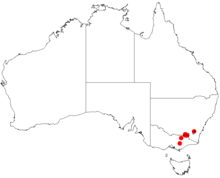Acacia phasmoides
Acacia phasmoides, commonly known as phantom wattle,[3] is a shrub species that is endemic to south-eastern Australia.[3] It grows to between 1 and 4 metres high and has phyllodes that are 5 to 12.5 cm long and 1 to 2 mm wide. The bright yellow globular flowerheads appear singly or in groups of two in the axils of the phyllodes from September to November, followed by curved seed pods which are 5 to 9 cm long and 2 to 4 mm wide.[3][4]
| Phantom wattle | |
|---|---|
| Scientific classification | |
| Kingdom: | Plantae |
| Clade: | Tracheophytes |
| Clade: | Angiosperms |
| Clade: | Eudicots |
| Clade: | Rosids |
| Order: | Fabales |
| Family: | Fabaceae |
| Clade: | Mimosoideae |
| Genus: | Acacia |
| Species: | A. phasmoides |
| Binomial name | |
| Acacia phasmoides | |
 | |
| Occurrence data from AVH | |
| Synonyms | |
|
Racosperma phasmoides (J.H.Willis) Pedley | |
The species was formally described in 1967 by botanist Jim Willis based on plant material collected from Pine Mountain in north-eastern Victoria.[4] Its distribution is limited to a small area on the border between south-eastern New South Wales and north-eastern Victoria.[5]
References
- Department of Sustainability, Environment, Water, Population and Communities. "Acacia phasmoides —Phantom Wattle". Species Profile and Threats Database. Canberra, Australian Capital Territory: Commonwealth of Australia. Retrieved 16 December 2012.
- "Acacia phasmoides ". Australian Plant Name Index (APNI), IBIS database. Centre for Plant Biodiversity Research, Australian Government, Canberra. Retrieved 15 December 2012.
- "Acacia phasmoides ". PlantNET - New South Wales Flora Online. Royal Botanic Gardens & Domain Trust, Sydney Australia. Retrieved 15 December 2012.
- "Acacia phasmoides ". Flora of Australia Online. Department of the Environment and Heritage, Australian Government.
- Sutter, Geoff (2010). "National Recovery Plan for Phantom Wattle - Acacia phasmoides" (PDF). State of Victoria Department of Sustainability and Environment. Archived from the original (PDF) on 22 March 2012. Retrieved 15 December 2012.
